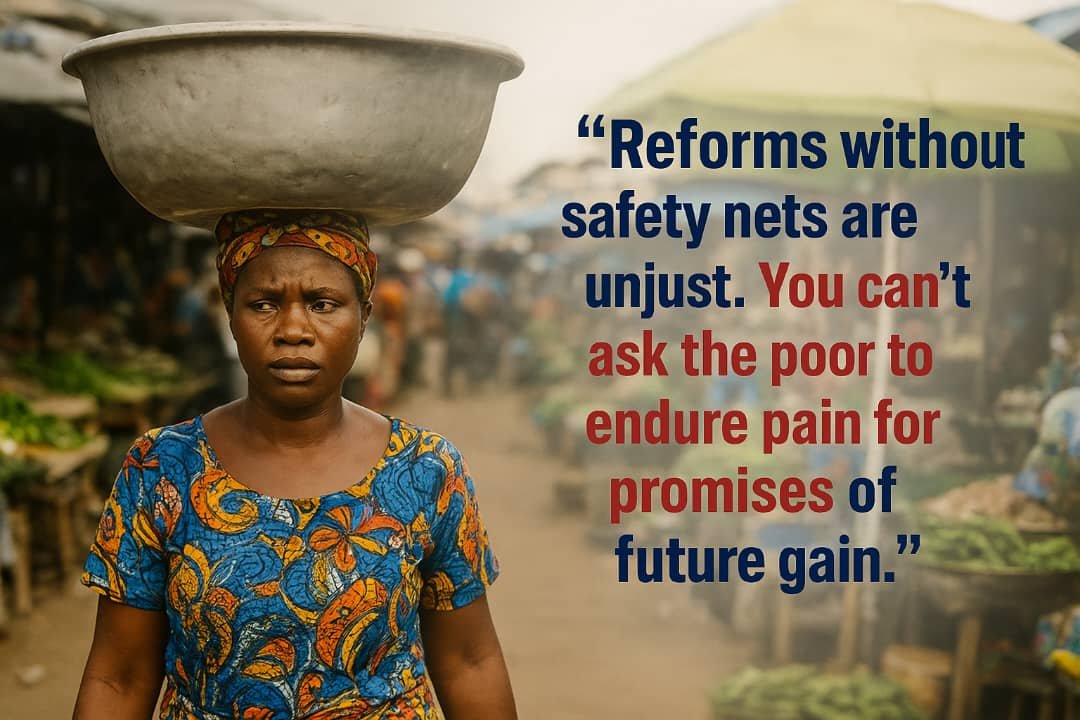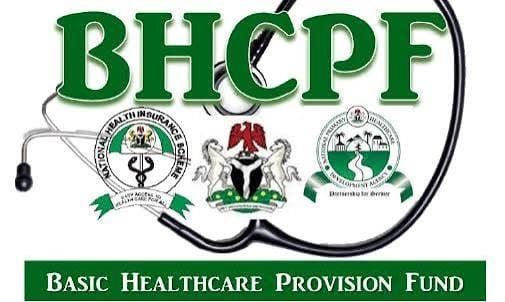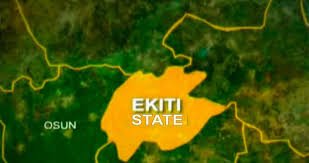
A market woman in Abuja navigates daily survival amid rising living costs — a reflection of Nigeria’s growing poverty crisis, despite ongoing economic reforms.
ABUJA, Nigeria – Three years after President Bola Tinubu launched sweeping economic reforms to rescue Africa’s largest economy, a new World Bank report has delivered a sobering verdict: poverty in Nigeria is rising, not falling.
The World Bank Nigeria Development Update (October 2025) estimates that 139 million Nigerians — 61% of the population — now live below the global poverty line of $2.15 per day. That’s nine million more than in 2023, when the administration began its economic reset.
While the Presidency insists the data “does not reflect the true state of the country,” millions of Nigerians say their empty pockets and dinner tables tell a different story.
In this report, Juliet Jacob travels through the suburbs of Abuja to uncover how economic adjustments meant to stabilise the nation have, for many, translated into hunger, joblessness, and despair.
The Big Picture: Progress Without Prosperity
On paper, Nigeria appears to be recovering. Growth rose to 3.9% in early 2025, inflation reportedly slowed, and foreign reserves stabilised after years of volatility.
But for millions, these figures are meaningless. The World Bank attributes the paradox to soaring food prices, weak income growth, and a fragile social safety net.
“In 2025, we estimate that 139 million Nigerians live in poverty,” the Bank stated.
“The challenge is clear: how to translate reform gains into better living standards.”
Despite higher oil revenues and a surge in tax collection, the benefits have not reached the average citizen. Instead, households are squeezed by rising costs of food, fuel, and housing — the direct fallout of fuel subsidy removal and exchange rate unification.
Policy vs. Pain: What Tinubu’s Reforms Changed
Since taking office in May 2023, President Tinubu’s economic team has implemented some of the boldest reforms in decades. The government argues these measures were essential to halt fiscal collapse.
Key Reform Measures
Fuel subsidy removal — saved billions but tripled transport and energy costs.
Exchange rate unification — aimed to attract investors but sent the naira tumbling.
National Cash Transfer Programme — relaunched to cushion hardship but covers few households.
Infrastructure and credit schemes — introduced to create jobs and reduce living costs.
Finance Minister, Wale Edun defended the policy direction:
“Nigeria’s fiscal and monetary policy adjustments under the Tinubu administration have involved a departure from reliance on printing money. The long-term goal is stability and sustainability.”
But critics, including opposition leader, Peter Obi, insist that reform without protection is unjust.
“Over 50 million Nigerians have slipped deeper into poverty in just two years. Economic reform without social reform is a failure.”
Life Below the Line: Struggles from Abuja’s Margins
In Dutse, a densely populated suburb in Abuja’s Bwari Area Council, the World Bank’s statistics come alive.
At a small roadside stall, Mrs. Patience, a mother of five and food vendor, shakes her head at her gas cylinder.
“I used to fill this for ₦3,000,” she said. “Now it’s almost ₦25,000. Everything is expensive — food, transport, even sachet water. The poor are the ones suffering the most.”
Cooking gas that cost ₦250 per kilogram in 2015 now sells for ₦1,500–₦2,500, while a loaf of bread has climbed from ₦500 to ₦2,300.
Even sachet water, a basic necessity, has doubled in price.
“A bag was ₦250; now it’s ₦450,” she lamented. “These increases have crippled my business. I can barely make profit after paying for ingredients.”
In nearby Kubwa, Mr. Paul, a tricycle operator, captures the despair:
“There’s serious poverty in Nigeria. People are suffering. Imagine, 1 kilogram of gas is ₦2,500 on the black market. How can ordinary people survive? There’s hunger and joblessness everywhere.”
For Musa, a father of three who shares a one-room apartment with his family, survival means cutting back on meals.
“We now eat twice a day — sometimes just garri and groundnut at night. My wife stopped selling zobo because ingredients became too expensive. We live one day at a time.”
For communities like Dutse and Kubwa, the World Bank’s warnings are not abstract—they are the soundtrack of daily existence.
Expert View: The Economics of Desperation
Development economist Professor Daniel, based in Kubwa, says Nigeria’s worsening poverty “isn’t surprising—it’s structural.”
“Beyond the headline figures, the reality is worse. Many ‘near-poor’ Nigerians—those just above the poverty line—are slipping back into poverty due to inflation and unemployment. It’s a silent crisis.”
He explained that poverty in Nigeria is multidimensional—tied to healthcare, education, housing, and electricity access.
“Inflation is the most visible face of poverty today. Prices have tripled in some sectors. The removal of subsidies worsened transport and food distribution costs. Families that were managing before are now skipping meals or withdrawing their children from school.”
While supporting fiscal reforms, he warns they must be human-centred:
“Reforms without safety nets are unjust. You can’t ask the poor to endure pain for promises of future gain. Nigeria must strengthen social protection—or risk losing another generation to poverty.”
He added that the roots of poverty lie not only in economics but in governance.
“Corruption, poor planning, and weak coordination have compounded the problem. Until Nigeria embraces accountability and data-driven policies, poverty will remain its biggest export.”
The Cost of Ignoring the Poor
Nigeria’s poverty crisis is more than a statistic — it’s a development emergency. The World Bank, UNDP, and African Development Bank warn that high poverty rates undermine everything from education to national security.
A shrinking middle class reduces consumer demand, stifling local industry. Rising malnutrition rates and school dropouts point to a generation at risk.
“We need to move from palliatives to systems — from handouts to empowerment,” said Dr. Grace Okorie, a social policy researcher.
“The poor must not just survive; they must thrive.”
Bridging the Divide: Towards Human-Centred Reform
Experts say Nigeria can still reverse course—but only with policies that prioritise people over politics.
What Needs to Change
Expand social protection coverage beyond the current 15% of vulnerable households.
Invest in agriculture and small-scale enterprises to create sustainable jobs.
Make food security and inflation control top priorities.
Improve transparency and accountability in poverty-alleviation funding.
Partner with NGOs and private sector actors to scale grassroots impact.
Professor Daniel emphasises a simple truth: “Denying poverty doesn’t erase it. Acknowledging it is the first step to ending it.”
The Urgency of Inclusion
Nigeria’s poverty paradox reveals an uncomfortable truth: economic growth without inclusion is an illusion.
The 2025 World Bank report is not a condemnation—it is a mirror. Behind every data point is a mother skipping meals, a child missing school, and a worker losing hope.
The government’s challenge is not merely to grow the economy but to humanise it—to ensure that policy victories translate into dignity and opportunity.
If the warning is heeded, this moment could mark a turning point for Africa’s largest economy.
If ignored, it may become an enduring symbol of a nation where millions remain poor amid plenty.




